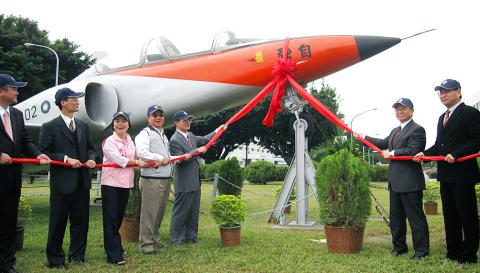The nation celebrated the 30th anniversary of the maiden flight of its self-designed, self-manufactured jet trainer yesterday.
In attendance at the Taichung complex of Aerospace Industrial Development Corp (AIDC) were Vice Minister of Economic Affairs Lin Sheng-chung (林聖忠), Taichung Mayor Jason Hu (胡志強) and representatives from the air force.
The event started with a film documenting the difficulties encountered during three decades of the trainer’s development and how they were overcome.

PHOTO: CNA
“Without the AIDC, there would be no aerospace industry in Taiwan,” Lin said.
In 1975, the air force asked the Aero Industry Development -Center, the company’s predecessor, to research and develop a new trainer to replace its aging T-33 trainers, AIDC said.
Sixty-three AT-3 trainers were made, the company said, of which two were prototypes. The first rolled out on July 17, 1980, and made its maiden flight on Sept. 16, 1980.
Development and manufacture of the plane was a significant step in the history of the nation’s -aviation industry, AIDC said, saying that it signaled Taiwan’s transition from propeller-driven aircraft to jet planes.
As a result of the experience gained through the development of the AT-3 trainers, the country was later able to develop its first defense fighter: A supersonic, twin-engined plane similar to the F-16, but slightly smaller and with a slightly shorter range.

Alain Robert, known as the "French Spider-Man," praised Alex Honnold as exceptionally well-prepared after the US climber completed a free solo ascent of Taipei 101 yesterday. Robert said Honnold's ascent of the 508m-tall skyscraper in just more than one-and-a-half hours without using safety ropes or equipment was a remarkable achievement. "This is my life," he said in an interview conducted in French, adding that he liked the feeling of being "on the edge of danger." The 63-year-old Frenchman climbed Taipei 101 using ropes in December 2004, taking about four hours to reach the top. On a one-to-10 scale of difficulty, Robert said Taipei 101

Nipah virus infection is to be officially listed as a category 5 notifiable infectious disease in Taiwan in March, while clinical treatment guidelines are being formulated, the Centers for Disease Control (CDC) said yesterday. With Nipah infections being reported in other countries and considering its relatively high fatality rate, the centers on Jan. 16 announced that it would be listed as a notifiable infectious disease to bolster the nation’s systematic early warning system and increase public awareness, the CDC said. Bangladesh reported four fatal cases last year in separate districts, with three linked to raw date palm sap consumption, CDC Epidemic Intelligence

US climber Alex Honnold left Taiwan this morning a day after completing a free-solo ascent of Taipei 101, a feat that drew cheers from onlookers and gained widespread international attention. Honnold yesterday scaled the 101-story skyscraper without a rope or safety harness. The climb — the highest urban free-solo ascent ever attempted — took just more than 90 minutes and was streamed live on Netflix. It was covered by major international news outlets including CNN, the New York Times, the Guardian and the Wall Street Journal. As Honnold prepared to leave Taiwan today, he attracted a crowd when he and his wife, Sanni,

Taiwanese and US defense groups are collaborating to introduce deployable, semi-autonomous manufacturing systems for drones and components in a boost to the nation’s supply chain resilience. Taiwan’s G-Tech Optroelectronics Corp subsidiary GTOC and the US’ Aerkomm Inc on Friday announced an agreement with fellow US-based Firestorm Lab to adopt the latter’s xCell, a technology featuring 3D printers fitted in 6.1m container units. The systems enable aerial platforms and parts to be produced in high volumes from dispersed nodes capable of rapid redeployment, to minimize the risk of enemy strikes and to meet field requirements, they said. Firestorm chief technology officer Ian Muceus said